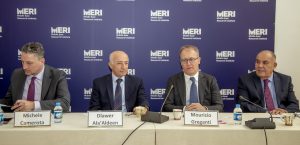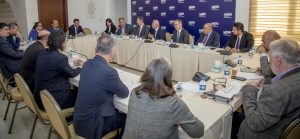“Italy has always supported Iraq at the most difficult moments of this country’s history”, said Maurizio Greganti, the Italian Ambassador to Iraq in a MERI policy debate on 17 February 2022.
This roundtable was attended by a number of policy makers, politicians, legislators and academic experts as well as the Italian Consul General in Erbil (listed below).
In his opening remarks, broadcasted on live TV channels, Amb. Greganti outlined the Italian policies and engagements in Iraq and the Kurdistan Region (KRI), emphasising that “the stability and prosperity of Iraq is in Italian interest… Iraq is a key country in the Middle East … if Iraq is stable, the whole region will be stable.
Italy provided military support and assistance during the ISIS war, where they deployed their troops in the KRI and Baghdad. Amb. Greganti stressed that the international coalition against ISIS has remained in place and will continue, since ISIS is still a threat for the region. Italy is a lead member of the NATO military mission in Iraq, and from May this year will take over the command of the mission. Italy has “over the years trained 70,000 Iraqi security forces and 63,000 Peshmergas.”

On trade relationships, Amb. Greganti added that Iraq is a strategic partner for Italy as the third biggest supplier of oil. There are a number of Italian oil and gas companies operational in Iraq. Before covid-19, the bilateral trade exchange was 5 billion Euros. During the first nine months of 2021 trade increased by a further 36 percent, bringing the total to 8 billion Euros. Beyond the oil and gas sector, Italy has engaged in several other sectors such archeological explorations, reconstruction and rehabilitation projects, said Amb. Greganti.
Amb. Greganti stated that since 2005, Italy has financed more than 300 million Euros in stabilization and development programs in Iraq. Italy has projects for internally displaced persons in areas previously damaged during the liberation war or occupied by ISIS. The Mosul Dam was given as a good example of an Italian response to an Iraqi appeal for saving vital infrastructure which suffered significant damage before and during the ISIS war. The Italian government has additional plans to assist Iraq in the water management sector and has invited Italian companies to invest in this field. In the Health sector, Italy has funded projects to across Iraq and the KRI, to help improve nursing and clinical services, and the protection of victims of gender-based violence.
Culture and heritage are also among the priorities for the Italian diplomatic mission in Iraq. Amb. Greganti believes that “the greatest resource of this country is its archeological and cultural heritage.” There is a need to manage and preserve these archeological sites. He believes that tourism in Iraq would be a big asset for the economy of the country. He added that there are eleven archeological missions by Italian archeologists in Iraq, including three in the KRI.
On the academic cooperation between Italy and Iraq, there are 38 memoranda of understanding between Italian and KRI Universities. He also added that this academic exchange and cooperation can be improved and expanded upon further.
Amb. Gregnati emphasised that Italy respects Iraq’s sovereignty and described stability as a “the most important currency” for Iraq to develop. He encourages foreign companies to come to Iraq and invest more; emaphsising that reforms and economic diversification are necessary for the country to prosper and function well.
Gender issues and protection of human rights and minorities are important parts of the Italian mission’s programmes in Iraq. Italy will support the call of the victims and survivors of the ISIS conflict.

Discussion Under Chatham House Rules
The Ambassador’s presentation was followed by a highly engaging discussion which was carried out under Chatham House Rules. During this part, a number of issues were highlighted and discussed by various participants, which are summarised here without attribution or affiliation.
- Making a Federal system work is a big challenge everywhere in the world, and the Iraqi political system is an experiment in progress. Therefore, it is not a surprise that forming a new government in Baghdad has remained a complex and challenging process.
- After what happened in Afghanistan, Iraqis were very concerned about rapid NATO withdrawal. However, Iraq appears to remain a priority for NATO, therefore its member countries are likely committed to stay in Iraq and help the process of security sector reforms.
- Participants believed that Italy, as a lead member in the NATO, anti-ISIS coalition and EU, can play an important role in helping the KRG reform the governing system and uniting the Peshmerga forces. This would be in the mutual interest of all parties involved.
- The latest decision by the Federal Court of Iraq on striking down the Kurdistan oil sector independence was considered very alarming. This should be dealt with cautiously between the central government and the KRG to avoid further conflicts.
- The call by survivors of ISIS war, particularly the Yazidi community, to establish an international ISIS tribunal court to bring the perpetuators to justice was discussed. It was emphasised that transitional justice is an important element to bring about stabilisation and peace to the country.
- It was debated that the international community has to find a solution on how to deal with the ISIS foreign fighters and their families which are stuck inside camps across Syria. This should be solved otherwise there could be repeats of the Hasaka Prison crisis in January 2022.
On reconciliation in Iraq, it was agreed that peace and reconciliation cannot be achieved without the participation of women and youth, or the bridging of different communities.
Participants:
- Ali Kurdistani, Political Analyst
- Bahar Ali, Women Rights
- Dara Khailani, Adviser to the Deputy Prime Minister
- Dlawer Ala’Aldeen, President of MERI
- Fuad Smail, Director of HR
- Gary Kent, Secretary, APPG on the KRI in the UK Parliament
- Giulia Mazzara, Political Advisor at the Italian Embassy
- Maurizio Greganti, Italian Ambassador to Iraq
- Mahmood Nashat, Advisor to the Kurdistan Parliament
- Michele Camerota, Italian Consul General in Erbil
- Mohammed Ihsan, Former Minister and University President
- Nahro Zagros, Academic
- Osman Laylani, Academic
- Saadi Pira, Patriotic Union of Kurdistan
- Kamaran Palani, Research Fellow, MERI
- Karwan Gazany, MP (KR Parliament)
- Tanya Gili Khailany, Form MP (Iraq)
- Hoshyar Siwaily, Kurdistan Democratic Party
- Sozan Arif, Women Empowerment
- Srush Khoshnaw, Research Assistant, MERI

